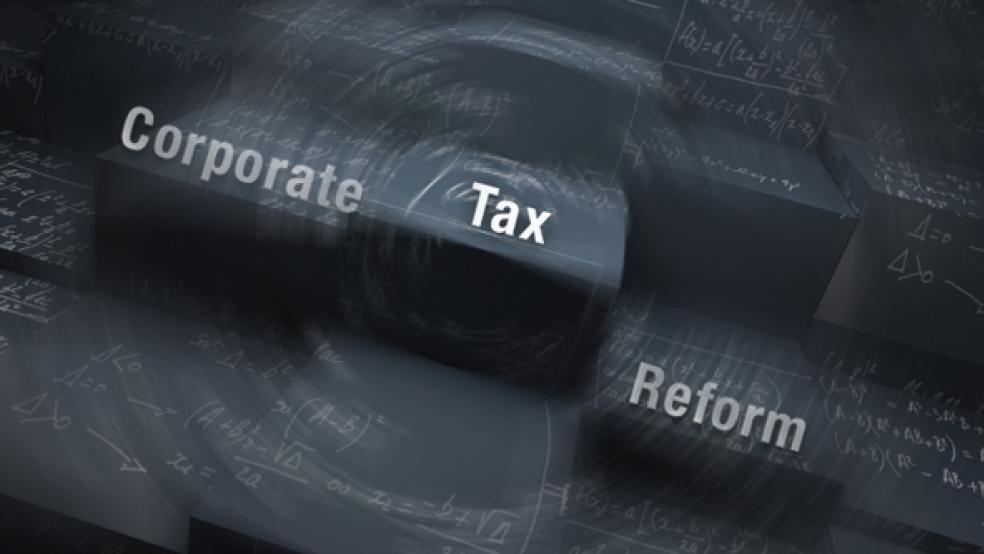Big business is back with a new group pushing to lower the top corporate tax rate.

Coca-Cola, General Electric, Google, Nike, Verizon, Wal-Mart, and 36 other major corporations announced the formation Tuesday of the Alliance for Competitive Taxation, or ACT.
It’s a new offensive after Apple took it on the chin two weeks ago from Sen. Carl Levin (D-MI). Apple was able to avoid paying any taxes on $30 billion of income from 2009 to 2012 by putting money into an Ireland-based subsidiary, escaping its tab due to conflicts between U.S. and Irish tax laws.
While the IRS grapples with the fallout from its scandalous targeting of Tea Party groups, Capitol Hill is full of talk about the need for broader reforms. The likelihood of the first substantial reforms since 1986 continues to be low, but this subject increasingly seems to be the core of the debate about how the government can help create jobs.
“If there’s a silver lining, it’s that the scandal highlights the urgent need to reform the IRS by simplifying the tax code,” Rep. Peter Roskam (R-IL) wrote in an editorial this week for Roll Call.
No one disputes that the corporate tax system is broken. The Obama administration put forward a framework for an overhaul back last year. House Republicans want to trim rates as well. Companies have already exerted advocacy pressure through groups such as the RATE Coalition, whose membership overlaps with the newly formed alliance.
How you fix the code depends on your perspective about corporate America. Multinational businesses are either good citizens eager to reinvest, armed with lawyers to game the system, or all of the above.
U.S. companies on the whole have prospered during an otherwise weak economic recovery. Their after-tax profits are an 11.4 percent share of national income, the highest level recorded in the past 65 years.
Just as ACT launched, the progressive Economic Policy Institute released a report showing “no evidence that high corporate tax rates have a negative impact on economic growth.” The report examined the statutory and effective tax rates since 1947, finding that reductions in rates did not produce an accelerating Gross Domestic Product.
The ACT sales pitch is that lower rates would be an economic afterburner, thrusting job growth to levels not seen in decades. Companies would feel more willing to bring back into the United States more than $1.7 trillion in foreign profits that have supposedly be sitting idle overseas. Congress has previously considered a tax holiday to bring home those profits.
“We need comprehensive revenue-neutral corporate tax reform to boost investment, productivity, and job creation in the U.S. and to strengthen the competitiveness of U.S. businesses in the global economy,” said Laura D’Andrea Tyson, a former top economic adviser for Bill Clinton who is working with the coalition.
ACT wants to eliminate tax deductions and credits in order to lower the top marginal rate from 35 percent to 25 percent. That makes the top marginal rate more competitive with European nations, although a slew of other taxes make the overall tax burden on the continent greater. If you factor in the deductions, the effective U.S. corporate tax rate was 27.2 percent in recent years.
The group also favors the introduction of a territorial tax system—where companies would only pay taxes on the money earned inside an individual country. Under the existing system, foreign income is taxed after it is repatriated.
This critical tweak could remove much of the friction as corporate profits circle the glove. Or, it will encourage new twists on the type of deal that Apple arranged in Ireland to further slash its tax burden.
“My guess is that if we lowered our tax rate to 25 percent, but if they keep a zero percent rate in the Cayman Islands, there is no incentive for them to bring it back to the United States,” said Thomas Hungerford, director of tax and budget policy at the progressive Economic Policy Institute and the author of its latest report.
Hungerford argues that the best way to remove the influence of different international tax rates would be for the United States to apply a tax on all global profits, so that companies would receive no advantage from sheltering their profits abroad.
House Ways and Means Committee Chairman Dave Camp (R-MI) released a plan two years ago that would exclude 95 percent of all foreign earnings from U.S. taxes.
Obama’s Treasury Department proposed a basic “minimum” tax on foreign earnings in their 2012 framework, while lowering the top rate for domestically earned income to 28 percent.
Because this difference, the status quo continues—something that Obama himself knows is a drag on the economy.
“I realize that tax reform and entitlement reform will not be easy,” he said just a few months ago in his State of the Union address. “But the alternative will cost us jobs, hurt our economy, visit hardship on millions of hardworking Americans.”



